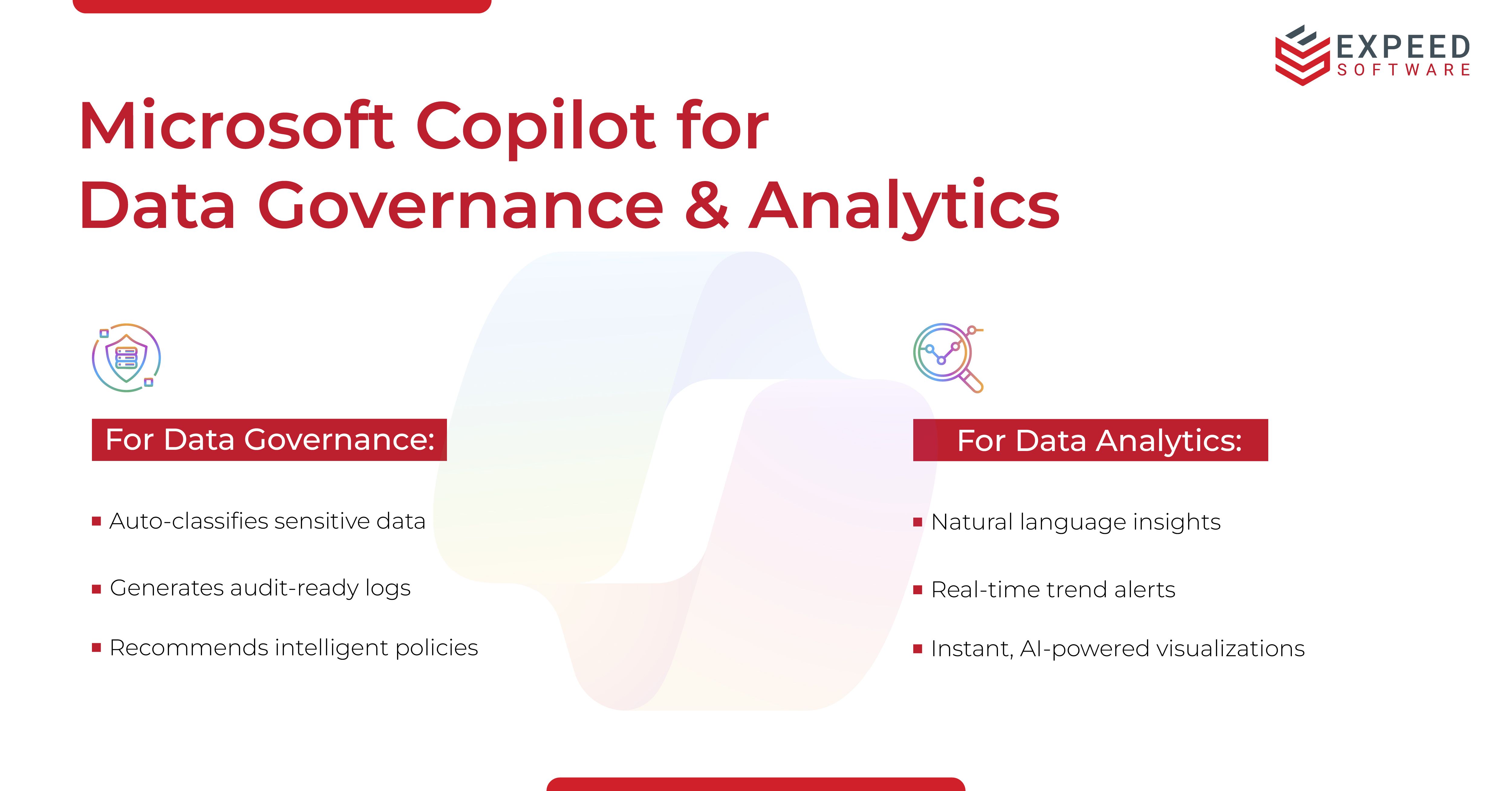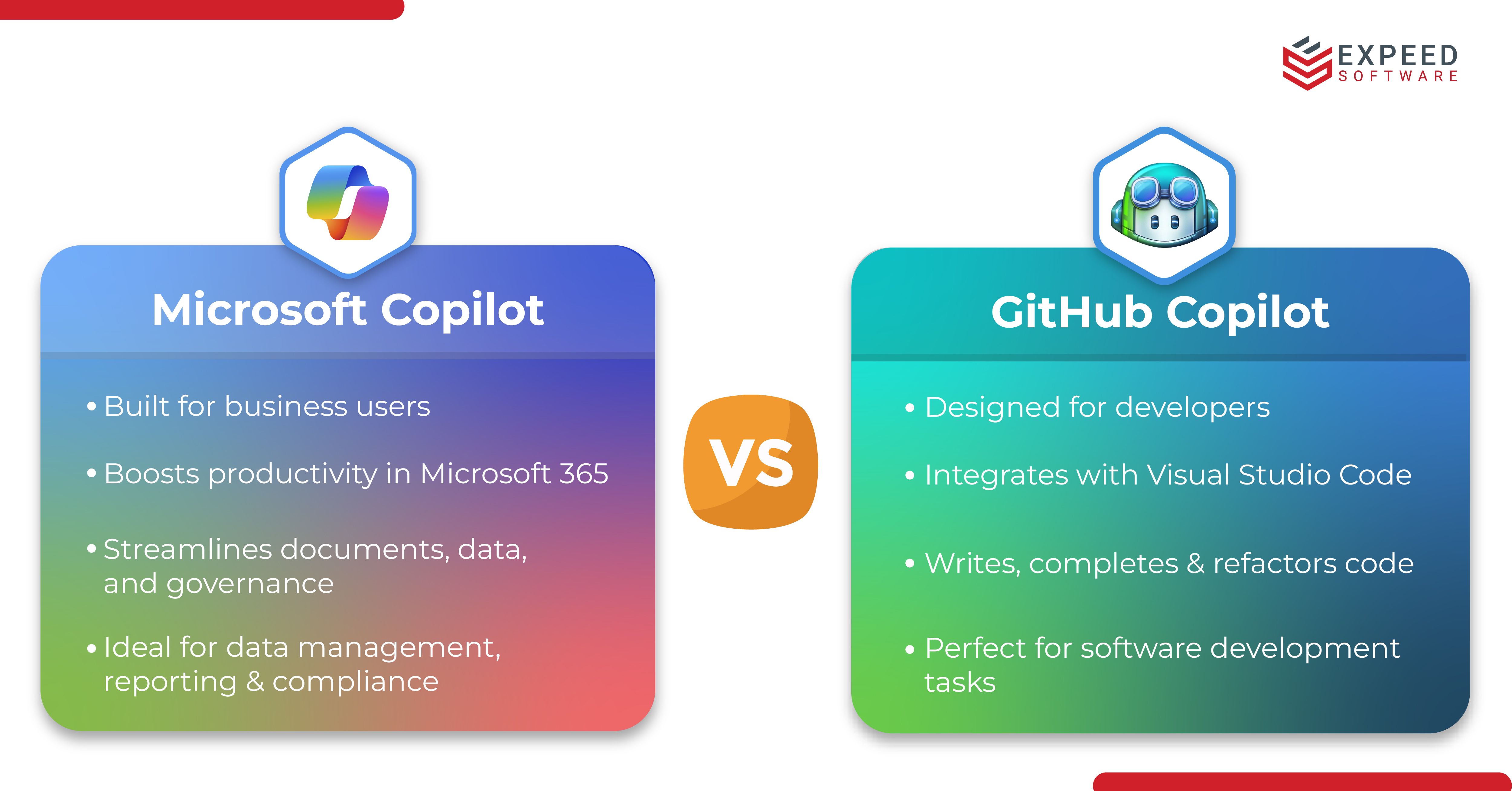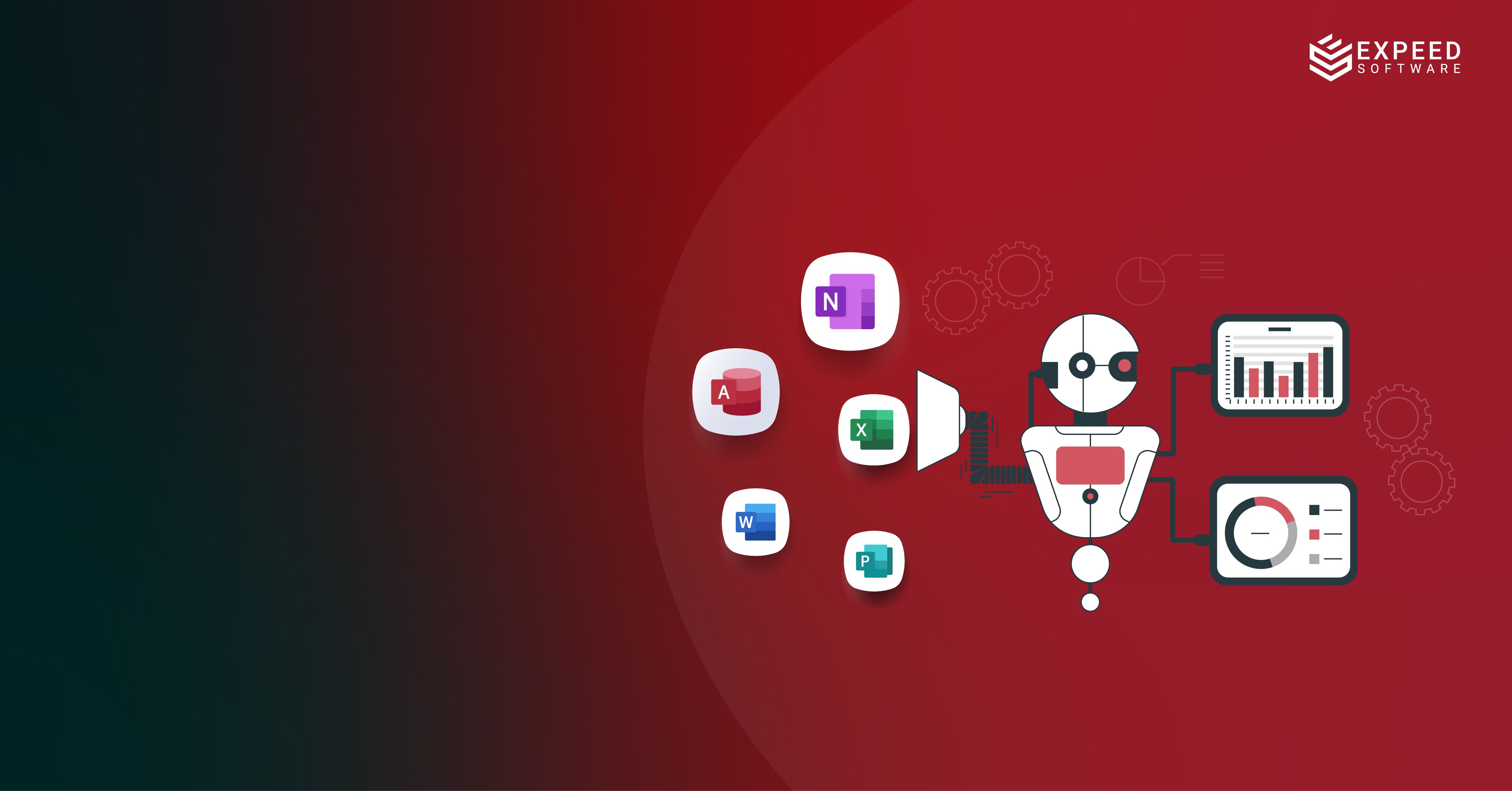Enterprise data is growing at an unimaginable rate— and keeping up isn’t that easy. As volumes increase and data complexity rises, traditional governance and analytics tools often find it hard to keep pace. Microsoft Copilot addresses this challenge by integrating AI-driven assistance directly into Microsoft 365. This AI-powered assistant simplifies data management, sharpens insights, and reduces the time teams spend on repetitive, manual tasks. It’s changing the way businesses handle data, one smart workflow at a time.
The blog unfolds how Microsoft Copilot helps improve data governance, supports analytics, and results in smarter, AI-driven data management strategies. We will also make a keen comparison to similar tools like GitHub Copilot, address security and compliance considerations, and outline how it’s being applied in industries worldwide.
How Microsoft Copilot is Redefining Enterprise Productivity
Enterprise productivity now requires more than just speed; it demands intelligent governance systems that deliver scalable results. Microsoft Copilot brings AI-driven data management to Microsoft 365, automating repetitive tasks, and strengthening data governance.
And the results are speaking for themselves — nearly 70% of Fortune 500 companies are now actively using it to streamline workflows and enhance data-driven decision-making.
At the core of this productivity transformation lie two critical capabilities: data governance and analytics. Microsoft Copilot AI is redefining how businesses manage, protect, and extract value from their data. Let’s explore how.

Microsoft Copilot for Data Governance
1. Automated Classification and Sensitivity Labeling
Managing sensitive business data requires precision and consistency — and that’s where Microsoft Copilot for data governance makes a difference. In collaboration with Microsoft Purview Information Protection, it helps recommend or apply sensitivity labels in real time. This process keeps PII, financial data, and other critical content secure while minimizing manual oversight, reducing human error, and ensuring regulatory compliance.
2. Intelligent Policy Recommendations
One of the challenges in data governance is adapting policies to shifting data usage. Microsoft Copilot can proactively recommend data governance policies by analyzing user activity, access patterns, and the sensitivity of documents. These AI-driven insights, powered by Microsoft Graph, align with your organization’s evolving risk profile, offering more than just routine suggestions.
3. Audit Trail Generation
For industries like healthcare and finance, maintaining an accurate audit trail is critical for compliance and accountability. Microsoft Copilot enables the automatic generation of detailed audit logs that capture who accessed what data, when, and for what purpose. This reduces manual documentation overhead and ensures operational efficiency during compliance audits.
Microsoft Copilot for Data Analytics
1. Natural Language Queries for Faster Insights
Analytics can be difficult without specialized skills to manipulate data. With Microsoft Copilot AI, users can overcome this by asking questions in natural, conversational language. For instance, users can ask questions such as "What were our top 5 performing regions last quarter?" and instantly receive accurate, data-driven responses. No coding or complex Excel functions are required. This empowers teams to focus on insights rather than data preparation.
2. Real-Time Trend Analysis
Using AI-driven models, Microsoft Copilot continuously monitors live data streams to identify emerging trends and detect anomalies. For example, it may warn a product manager if sales in a particular area fall below expectations compared to previous periods — all without manually combing through reports. By automating this process, Copilot frees up valuable time for strategic initiatives.
3. Advanced Visualization Support
Generating impactful dashboards or charts used to be time-consuming. Now, Copilot can interpret data tables and instantly recommend or create visualizations in Excel or Power BI that highlight key metrics and patterns. This automation enhances accuracy and consistency across reports. This capability accelerates reporting cycles and improves stakeholder engagement.
Use Cases Across Industries
Healthcare: Microsoft Copilot plays a vital role in healthcare by helping clinicians and administrators handle sensitive patient information responsibly. It flags documents for potential HIPAA violations, produces detailed summaries of patient medical history, and supports accurate regulatory compliance reporting. This ensures that healthcare providers meet strict legal and ethical requirements.
Finance: Financial teams are streamlining their operations with Microsoft Copilot AI, using it to automate regulatory reporting, detect anomalies in transaction data, and simplify complex audit workflows. The platform ensures compliance with SOX, GDPR, and internal governance policies while minimizing risk and improving operational efficiency.
Retail: Microsoft Copilot enables retailers to monitor customer feedback in real time, uncover buying trends, and accurately predict inventory requirements. Throughout these processes, it guarantees that personal customer information is securely managed and compliant with data protection policies.
Microsoft Copilot vs GitHub Copilot

Despite having similar names, Microsoft Copilot and GitHub Copilot serve two entirely different purposes. Microsoft Copilot targets business professionals, enhancing productivity within Microsoft 365 by simplifying document management, refining enterprise analytics, and supporting data governance. In contrast, GitHub Copilot is tailored for developers, working within coding environments like Visual Studio Code to assist with real-time code suggestions, completions, and refactoring.
When deciding between Microsoft Copilot and GitHub Copilot, it’s essential to align the tool with the task. If it’s writing and refining code, GitHub Copilot is your go-to. For streamlining documents, managing data, and ensuring compliance, Microsoft Copilot is the better fit. Many organizations find value in leveraging both, depending on the needs of different teams.
Microsoft Copilot and GitHub Copilot demonstrate how AI is being tailored for different roles and tasks — from leveraging AI in data management within spreadsheets to assisting with coding in an IDE, there’s a smart tool built for every job.
The Strategic Importance of Microsoft Copilot in Enterprise Data Ecosystems
Transforms Data from Liability to Strategic Asset
By embedding AI-powered governance and analytics into daily workflows, Microsoft Copilot turns enterprise data from a compliance burden into a driver of competitive advantage.
Delivers Proactive, AI-Driven Governance
Rather than reacting to issues, Copilot continuously monitors data activity, flags potential risks, and enforces governance standards — ensuring enterprises stay ahead of regulatory and operational threats.
Accelerates Executive Decision-Making with Contextual Insights
Copilot brings real-time, AI-generated insights directly within trusted business tools like Excel and Teams, enabling leaders to make smarter, faster, and better-informed decisions.
Enables Scalable, Embedded Data Strategies
By integrating seamlessly with operational workflows, Copilot reduces reliance on centralized IT teams and empowers business units to execute scalable, policy-compliant data initiatives.
Future-Proofs Data Ecosystems for Evolving AI and Compliance
As AI regulations and data privacy frameworks evolve, Copilot helps organizations stay compliant, minimize operational disruption, and maintain the flexibility needed to pivot quickly.
Conclusion
Data isn’t slowing down — it’s growing by the second. This is where organizations require smarter and more intelligent data management systems that provide both efficiency and security. Microsoft Copilot stands as a transformative solution that revolutionizes data governance and analytics by transforming intricate information into useful business insights. Adopting AI-driven tools like Copilot is becoming a business-critical step for organizations aiming to future-proof their operations. At Expeed Software, we help organizations harness the full potential of their data through smart solutions like Microsoft Copilot, helping them streamline operations, reinforce compliance, and make faster, high-impact decisions.

